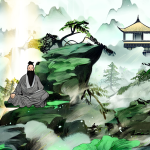《送孟东野序》原文

大凡物不得其平则鸣:草木之无声,风挠之鸣;水之无声,风荡之鸣。其跃也或激之,其趋也或梗之,其沸也或炙之。金石之无声,或击之鸣。人之于言也亦然:有不得已者而后言,其歌也有思,其哭也有怀。凡出乎口而为声者,其皆有弗平者乎!
乐也者,郁于中而泄于外者也,择其善鸣者而假之鸣:金、石、丝、竹、匏、土、革、木八者,物之善鸣者也。维天之于时也亦然:择其善鸣者而假之鸣。是故以鸟鸣春,以雷鸣夏,以虫鸣秋,以风鸣冬。四时之相推敚,其必有不得其平者乎!
其于人也亦然:人声之精者为言,文辞之于言,又其精也,尤择其善鸣者而假之鸣。其在唐、虞,咎陶、禹,其善鸣者也,而假以鸣。夔弗能以文辞鸣,又自假于《韶》以鸣。夏之时,五子以其歌鸣。伊尹鸣殷,周公鸣周。凡载于《诗》《书》六艺,皆鸣之善者也。周之衰,孔子之徒鸣之,其声大而远。《传》曰:“天将以夫子为木铎。”其弗信矣乎!其末也,庄周以其荒唐之辞鸣。楚,大国也,其亡也,以屈原鸣。臧孙辰、孟轲、荀卿,以道鸣者也。杨朱、墨翟、管夷吾、晏婴、老聃、申不害、韩非、慎到、田骈、邹衍、尸佼、孙武、张仪、苏秦之属,皆以其术鸣。秦之兴,李斯鸣之。汉之时,司马迁、相如、扬雄,最其善鸣者也。其下魏、晋氏,鸣者不及于古,然亦未尝绝也。就其善者,其声清以浮,其节数以急,其辞淫以哀,其志弛以肆,其为言也,乱杂而无章。将天丑其德莫之顾邪?何为乎不鸣其善鸣者也!
唐之有天下,陈子昂、苏源明、元结、李白、杜甫、李观,皆以其所能鸣。其存而在下者,孟郊东野始以其诗鸣。其高出魏、晋,不懈而及于古,其他浸淫乎汉氏矣。从吾游者,李翱、张籍其尤也。三子者之鸣信善矣,抑不知天将和其声,而使鸣国家之盛邪?抑将穷饿其身,思愁其心肠,而使自鸣其不幸邪?三子者之命,则悬乎天矣。其在上也,奚以喜?其在下也,奚以悲?东野之役于江南也,有若不释然者,故吾道其命于天者以解之。
中文翻译
大凡事物得不到平衡就会发出声响:草木本来没有声音,风摇动它就发出声响;水本来没有声音,风震荡它就发出声响。水浪跳跃,可能是被外物激荡;水流湍急,可能是被外物阻塞;水沸腾,可能是被火加热。金属石器本来没有声音,有人敲击它就发出声响。人的言论也是这样:心中有不得已的地方,然后才表达出来;人们唱歌是为了寄托情思,哭泣是为了抒发情怀。凡是发出的声音,大概都是因为心中有不平衡之处吧!
音乐,是人们内心郁结的情感通过外在形式宣泄出来的,人们选择那些善于发声的东西借助它们来发声。金、石、丝、竹、匏、土、革、木这八类东西,是各类事物中善于发声的。自然界对于四时也是如此:选择那些善于发声的东西借助它们来发声。所以用鸟儿啼鸣来表现春天,用雷声轰鸣来表现夏天,用虫儿哀鸣来表现秋天,用寒风呼啸来表现冬天。四季的更替变化,其中一定有不得平衡的地方吧!
对于人来说也是这样:人类声音的精华是语言,文辞对于语言来说,又是其中的精华,所以尤其要选择那些善于表达的人借助他们来发声。在唐尧、虞舜的时代,咎陶、禹是善于表达的人,就借助他们来表达政见。夔不能用文辞来表达,就借助《韶》乐来表达。夏朝的时候,太康的五个弟弟用他们的歌谣来表达心声。伊尹为殷商发声,周公为周朝发声。凡是记载在《诗经》《尚书》等六经上的文章,都是善于表达的人的作品。周朝衰落的时候,孔子和他的弟子们表达自己的思想,他们的声音宏大而深远。《论语》上说:“上天要让孔子成为传播教化的使者。”难道不是这样吗?到了末期,庄周用他那荒诞不经的言辞来表达。楚国是大国,在它灭亡的时候,屈原用他的诗篇来表达哀思。臧孙辰、孟轲、荀卿,用他们的学说来表达观点。杨朱、墨翟、管夷吾、晏婴、老聃、申不害、韩非、慎到、田骈、邹衍、尸佼、孙武、张仪、苏秦这些人,都用他们的学说来表达主张。秦朝兴起的时候,李斯为它表达。汉朝的时候,司马迁、司马相如、扬雄是最善于表达的人。此后魏晋时期,善于表达的人比不上古代,然而也从未断绝过。就其中优秀的来说,他们作品的声音清越却浮浅,节奏频繁却急促,言辞放荡却哀伤,志向颓废却放纵,他们的言辞杂乱而没有条理。这大概是上天认为那个时代的德行丑恶而不去照顾他们吧!为什么不让那些善于表达的人发出好的声音呢!
唐朝建立后,陈子昂、苏源明、元结、李白、杜甫、李观,都用他们的才能来表达。那些还活着的并且地位低下的人当中,孟郊开始用他的诗歌来表达。他的诗高出魏晋时期的作品,不懈怠地努力达到了古人的水平,其他作品也渐渐接近汉代的水平了。跟我交游的人中,李翱、张籍是最优秀的。这三个人确实善于表达,但是不知道上天是要使他们的声音和谐,让他们的作品歌颂国家的兴盛呢?还是要使他们遭受困厄饥饿,忧愁哀伤,让他们通过作品表达自己的不幸遭遇呢?这三个人的命运,就掌握在上天的手里了。他们身处高位,有什么可高兴的呢?他们身处低位,又有什么可悲伤的呢?东野到江南去任职,好像有些闷闷不乐,所以我谈谈命运由上天决定的道理来安慰他。
英文翻译
Generally speaking, when things are not in a state of equilibrium, they will make a sound. Grass and trees are originally silent, but they make a sound when the wind stirs them; water is originally silent, but it makes a sound when the wind disturbs it. When the water waves leap, perhaps they are agitated by external objects; when the water flows rapidly, perhaps they are blocked by something; when the water boils, perhaps it is heated by fire. Metals and stones are originally silent, but they make a sound when struck. Human speech is also like this. When there is something unbearable in the heart, people then express it. People sing to express their thoughts and cry to vent their emotions. Almost all the sounds made are probably because there is some imbalance in the heart.
Music is the way people vent their pent - up emotions through external forms. People choose those things that are good at making sounds to help them express themselves. Metals, stones, silk, bamboo, gourds, clay, leather, and wood are the eight kinds of things that are good at making sounds among all things. Nature is also like this with the four seasons. It chooses those things that are good at making sounds to help it express itself. Therefore, the chirping of birds represents spring, the thunder in summer represents the season, the chirping of insects represents autumn, and the howling of the cold wind represents winter. The alternation of the four seasons must have something that is not in balance.
The same is true for human beings. The essence of human voice is language, and words are the essence of language. So especially, people choose those who are good at expressing themselves to help them express their ideas. In the era of Emperor Yao and Emperor Shun, Gao Tao and Yu were good at expressing themselves, so they were used to express political views. Kui could not express himself in words, so he used the music of "Shao" to express himself. In the Xia Dynasty, the five sons of Emperor Tai Kang used their ballads to express their feelings. Yi Yin expressed himself for the Shang Dynasty, and the Duke of Zhou expressed himself for the Zhou Dynasty. All the articles recorded in "The Book of Songs", "The Book of Documents" and other Six Classics are the works of those who were good at expressing themselves. When the Zhou Dynasty declined, Confucius and his disciples expressed their thoughts. Their voices were loud and far - reaching. It is said in "The Analects": "Heaven is going to make Confucius a wooden - clappered bell to spread the teachings." Isn't this true? In the later period, Zhuangzi used his absurd words to express himself. Chu was a large country. When it perished, Qu Yuan used his poems to express his sorrow. Zangsun Chen, Mencius, Xun Kuang used their doctrines to express their views. Yang Zhu, Mo Di, Guan Zhong, Yan Ying, Laozi, Shen Buhai, Han Fei, Shendao, Tian Pian, Zou Yan, Shijiao, Sun Wu, Zhang Yi, Su Qin and others all used their doctrines to express their ideas. When the Qin Dynasty rose, Li Si expressed himself for it. In the Han Dynasty, Sima Qian, Sima Xiangru, and Yang Xiong were the best at expressing themselves. After that, in the Wei and Jin dynasties, those who were good at expressing themselves were not as good as those in ancient times, but they never completely disappeared. Among the excellent ones, their voices were clear but superficial, their rhythms were frequent but hasty, their words were wanton but sad, their aspirations were slack but unrestrained, and their words were chaotic and without order. Perhaps Heaven thought that the virtue of that era was ugly and ignored it. Why didn't Heaven let those who were good at expressing themselves make good sounds?
When the Tang Dynasty was founded, Chen Ziang, Su Yuanming, Yuan Jie, Li Bai, Du Fu, and Li Guan all used their talents to express themselves. Among those who were still alive and in humble positions, Meng Jiao began to use his poetry to express himself. His poetry was superior to that of the Wei and Jin dynasties. He made unremitting efforts to reach the level of the ancients, and his other works also gradually approached the level of the Han Dynasty. Among those who associated with me, Li Ao and Zhang Ji were the best. These three people were indeed good at expressing themselves, but I don't know whether Heaven wanted to make their voices harmonious and let their works praise the prosperity of the country, or wanted to make them suffer from poverty and hunger, worry and sorrow in their hearts, and let them express their own misfortunes through their works. The fates of these three people were in the hands of Heaven. If they were in high positions, what was there to be happy about? If they were in low positions, what was there to be sad about? Dongye was sent to take up an official post in the south of the Yangtze River and seemed somewhat dissatisfied. So I talked about the principle that fate is determined by Heaven to comfort him.
背景补充
创作背景
本文是韩愈为孟郊去江南就任溧阳县尉而写的一篇赠序。孟郊(字东野)与韩愈相交甚厚,他一生穷困潦倒,仕途坎坷,直到五十岁才得到溧阳县尉这样一个卑微的官职。韩愈对孟郊的才华十分钦佩,对其遭遇深感同情,于是在孟郊赴任之际写下此文,一方面表达对孟郊的慰勉之情,另一方面也借此抒发自己对人生、命运以及文学创作等诸多问题的感慨。
作者简介
韩愈(768年-824年),字退之,河南河阳(今河南省孟州市)人,自称“郡望昌黎”,世称“韩昌黎”“昌黎先生”。他是唐代杰出的文学家、思想家、哲学家、政治家,是唐代古文运动的倡导者,被后人尊为“唐宋八大家”之首。
韩愈一生致力于复兴儒学,反对佛道二教,主张“文以载道”,强调文章要为儒家的道统服务。他的散文风格雄浑大气、奇崛险怪,说理透彻,逻辑严密,对后世散文的发展产生了深远影响。其代表作品有《师说》《马说》《进学解》等。在诗歌方面,韩愈也取得了很高的成就,他的诗作风格独特,以文为诗,想象丰富,意境奇特。
文章主旨
《送孟东野序》的主旨是通过阐述“物不得其平则鸣”的观点,来安慰和激励孟郊。作者认为,世间万物,包括人在内,只要心中有不平之事,就会发出声音来表达。从自然界的风吹草动、鸟鸣虫叫,到人类社会的言论、音乐、文学创作等,都是“不平则鸣”的表现。孟郊一生怀才不遇,仕途不顺,但他的诗歌正是他内心愤懑不平的表达。韩愈借此鼓励孟郊不要因一时的困境而气馁,要继续用自己的才华和作品来抒发情感,同时也表达了对孟郊诗歌才华的高度赞赏和对命运无常的感慨。
作品影响
《送孟东野序》是韩愈赠序文中的经典之作,具有重要的文学价值和思想意义。在文学方面,它体现了韩愈散文的独特风格和艺术魅力,其论证严密、逻辑清晰,语言生动形象,富有感染力。文章中提出的“物不得其平则鸣”的观点,不仅是对文学创作规律的深刻总结,也具有普遍的哲学意义,对后世的文学理论和创作产生了深远影响。许多文人学者在论述文学创作的起源和动机时,都借鉴了这一观点。在思想方面,文章表达了对人才遭遇的同情和对社会不公的批判,体现了韩愈积极用世、关心民生的情怀,激励着后人在困境中坚守自我,追求理想。












评论功能已关闭。